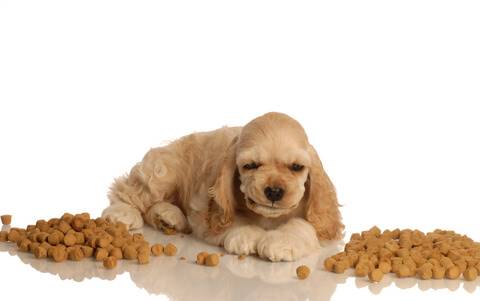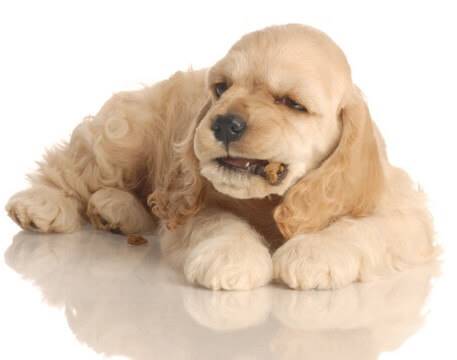- Home
- Cocker Spaniel training
- How to prevent dog food aggression
How To Prevent Dog Food Aggression
Dog food aggression can kick in at any time and if it’s not
managed sooner or later someone is going to get hurt.
Learn how to prevent food aggression in dogs and keep meal times relaxed, enjoyable, and above all,
safe!
Food Aggression In Dogs
At first, a growling puppy guarding his food may look and sound a little cute, and a nip from puppy teeth, whilst they're sharp and may hurt, they probably won't do a lot of damage.
 It's mine...all mine!
It's mine...all mine!However, a bite from an adult dog is a different matter altogether.
That's why it's important to make sure dog food aggression never rears its ugly head in the first place.
So, even if your puppy isn't showing any signs of food or resource guarding, I recommend you read the follow advice as it will help to stop this form of dog aggression from arising in the first place.
However, if your Cocker Spaniel is already showing signs of food aggression, you can learn how to remedy it here.
How To Prevent Dog Food Aggression
To help prevent food aggression happening in the first place there are a few simple steps you can take, as follows:
- Split your Cocker Spaniel's meal allowance into two and feed him twice each day, morning and early evening.
- Always
ask your puppy to 'Sit' or 'Down' while you prepare his meal and before you begin feeding him; he should be asked to work for his food. We all know there's no such
thing as a free lunch!
 Yum Yum!
Yum Yum!- Don't allow your Cocker
to eat until you say so. Release him from his 'sit or stay' and then allow him eat. This will
help to teach him discipline and control, and it will also help to
reinforce your position as his pack leader.
- If
your puppy doesn't eat his meal within 15 minutes, (as if!) I
recommend that you remove it and always put it away, out of sight,
between meals.
I don't believe in 'free feeding' (mainly because Cockers can be little greedy guts), but in this case, if he can't see his food bowl, he won't have anything to guard, will he? - Get your Cocker used to you being present or nearby at meal times. Stand over or sit by him while he eats, and practice approaching him a couple of times during his
feeding to de-sensitise him to your presence.
- Stroke
your puppy when he's eating to get him used to human contact at meal times.
- Hand feed your pup from time to time. If you're feeding your puppy on kibble it can be a little time consuming, but the benefits are really worth it.
- Your puppy should be comfortable with you (or other members of your family) being around during meal times. Occasionally dropping a tasty tit-bit into his dish as you walk by him while he's feeding will help him to associate your and your family's presence (while he's eating) with a pleasant experience!
Important Note: Never pet an animal that is already showing signs of dog food aggression. It could prove to be very dangerous and you may be injured.
- Don't always feed your Cocker in the kitchen; feed him in other areas of your home and garden too.
- If
you feed your dog food from your plate it will only teach him to hang
around the dinner table and scrounge or beg tit-bits from you. More importantly, it can trigger dog food aggression.
It's best to place your pet away from your dining area while you eat. You can save any scraps for his bowl.
The above pointers should help to get your puppy used to
having you around at meal times. It will also teach him that his meals comes
from you; you do not take them away from him.
Your aim is to have your Cocker understand and accept that you are the alpha male (not him) and to help reassure him that you aren't a threat to his food; you're not going to steal it from him!
The outcome should be that your boy doesn't feel in any way threatened when you or another member of your family approaches him while he's feeding; he should view your approach (and presence) as a pleasant and desirable experience.
Good luck!
Important Note: If your Cocker begins to display signs of dog food aggression, (or any other type of aggressive dog behaviour) it's always best to consult a canine behavioural therapist.
How To Fix Dog Food Aggression!
If you'd like to learn more about food aggression, the causes, signs to look for, and three ways to fix food aggression in dogs simply follow this link.
Photo Credits for Dog Food Aggression:
1. Willee Cole at Dreamstime.com - https://www.dreamstime.com/royalty-free-stock-photo-puppy-eating-dog-food-image7394745
2. Willee Cole at Dreamstime.com - https://www.dreamstime.com/stock-image-puppy-eating-dog-food-image7070021


